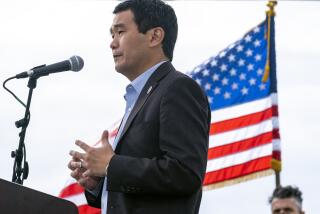Teens’ arrest in sign protest roils Glendora
Even by the notoriously nasty standards of small-town politics in Glendora, the late-night arrest of two teenagers last week has taken local elections in this little city to a bracingly new low.
The 18-year-olds, Keleigh Marshall and Christina Giammalva, set out the night of Feb. 19 to engage in some mischief by putting stickers on the political signs of Glendora elected leaders. The stickers read, “This sign violates Glendora city ordinance,” a reference to Glendora’s law prohibiting campaign signs on public property.
Notwithstanding that law and an accompanying set of rules that regulate the placement of campaign material, the same council members who passed the regulations appeared to be violating them -- and thus the protest by Marshall and Giammalva.
While the young women were affixing those bulletins, however, they were confronted by none other than Councilman Gary Clifford, who is among those running for reelection. He demanded that they remove the stickers, and when they refused, the retired police officer called for backup.
Glendora’s tiny Police Department responded in force, rolling out four cars and a sergeant -- every available unit that Monday night. The strike force ignored the teenagers’ allegations that Clifford was the scofflaw and came down hard on the young women.
They were handcuffed by the side of the road and taken to the station in separate cars. They said they were booked, searched and kept in jail four hours, and interrogated separately while their parents and lawyers were held at bay. Later, when a department spokesman released a statement to the media on the arrests, he identified both teenagers by name but omitted Clifford’s identity, describing him only as “one of the victims” of the vandalism.
Glendorans are used to backbiting in their local politics -- recalls and accusations of misconduct have been commonplace in recent years -- but the spectacle of a councilman and his Police Department placing two teenagers in irons dismayed many residents.
“To me, it’s criminal,” said Gene Osko, a retired judge who has agreed to represent the teenagers.
Erica Landmann-Johnsey, a resident of Glendora since 1981, was equally disturbed. “I’m just appalled,” she said. “I feel horrible for the girls.”
There’s now talk of a recall should Clifford win Tuesday. Landmann-Johnsey says she’ll happily circulate petitions to make that happen.
The teenagers, meanwhile, are reeling. “It’s embarrassing,” said Marshall, whose father served on the City Council until being recalled several years ago. “I have this reputation as a criminal in Glendora.”
Giammalva agreed. “It was pretty traumatic, to be honest with you,” she said.
For his part, Clifford shows no signs of remorse or second thoughts. He says he offered to drop the matter if the young women would remove the stickers, and he accuses them and their supporters of blowing the incident out of proportion, of “trying to build this up into something that it isn’t.”
In addition, Clifford complains that the teenagers were defacing only the signs of candidates they opposed, evidence that their actions were motivated by politics. And although he acknowledges that some signs have been posted on public property, he argues that all sides have done it.
The remedy for such violations, he adds, is to file a complaint, not to deface property. “You still don’t have the right to vandalize,” he said. “It’s just not appropriate behavior.”
Police Chief Chuck Montoya, meanwhile, has been thrust uncomfortably into the middle of the city’s political campaign. Interviewed Friday, he said his officers did not cite Clifford because the city attorney had advised the department not to enforce the sign ordinance in cases of political displays. The 1st Amendment, Montoya said, gives wider latitude to candidates than it does to others when it comes to sign advertising.
Still, it was the council that adopted rules for political signs in 2004, and those rules -- which Montoya said lack the force of an ordinance -- specifically direct candidates not to put up their signs on medians in public streets or on parkways or other public property. Clifford was among the council members who approved those rules.
As for the case against the teenagers, Montoya declined to comment, saying it was still under investigation. It has yet to be referred to the Los Angeles County district attorney’s office, which would decide whether prosecution was warranted. But he did concede that the matter was unorthodox.
“I’ve been in law enforcement for 32 years,” he said. “This is a unique situation.”
More to Read
Get the L.A. Times Politics newsletter
Deeply reported insights into legislation, politics and policy from Sacramento, Washington and beyond. In your inbox three times per week.
You may occasionally receive promotional content from the Los Angeles Times.











